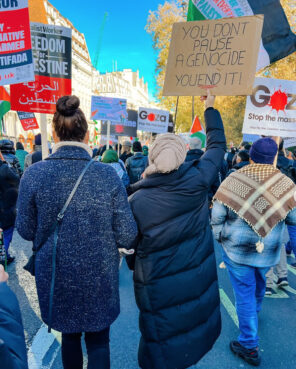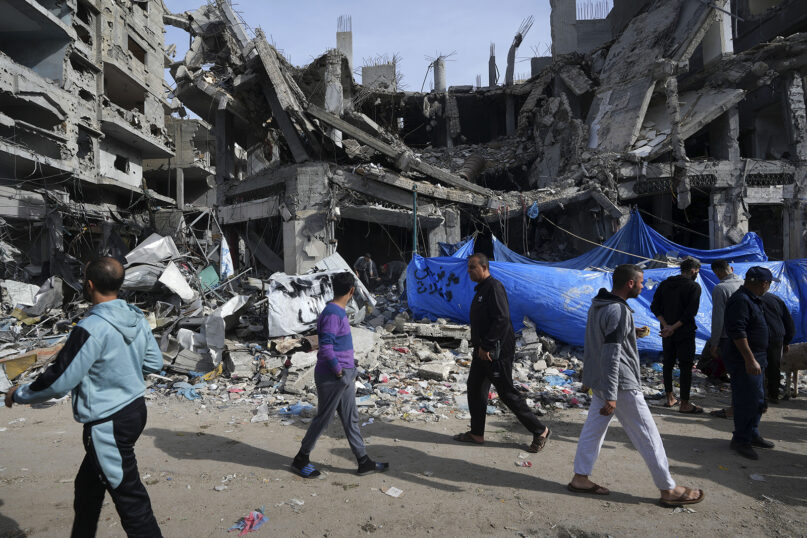(RNS) — The recently extended cease-fire in Gaza that has allowed the swap of women and children Palestinian prisoners for Israeli hostages and an influx of humanitarian assistance is being celebrated for allowing relief for those on the ground in the war zone.
But the relative quiet is only a reminder that the status quo in Gaza is cruelty. There is no daily life left in northern Gaza, and the cease-fire provides little rest for those walking the streets finding decomposing bodies and scattered limbs while bracing themselves for what is still to come.
What has been happening in Gaza has been called a genocide in the making by United Nations human rights experts, a belief shared by other human rights organizations and many U.N. member states.
Yet in an interview with Sky News this month, Israeli opposition leader Yair Lapid justified the killings by his government. “The majority of the people who were killed were Hamas terrorists. People are saying this number — ‘12,000 people were killed’ — yes, Hamas is an army of 40,000 and many of them were killed. And good riddance.”
RELATED: Before we find peace in the Mideast, we have to stop seeing only the ‘other’
But according to numbers provided by Gazan health officials that The New York Times has deemed credible, the Israeli military has “ridded” Gaza of thousands of women and children, who make up some 40% of the more than 12,000 Palestinians murdered in Israel’s bombing campaign. The number of women and children killed in the past two months has already surpassed the entire civilian death toll of the Russo-Ukrainian war.

A sign reads “You Don’t Pause A Genocide, You End It!” during a pro-Palestinian march in London on Nov. 25, 2023. (Photo courtesy of Ellie Quinn)
Lapid blurs these facts because the mere notion of Israel being associated with the word “genocide” doesn’t fit the Zionist Weltanschauung, in which Israel is incapable of indiscriminate carnage because it is an exceptional victim amid a region of savages requiring authoritarian rule.
The official Israeli line is that war justifies Israel’s killing of civilians. In comments prior to Tuesday’s cease-fire deal, Israeli Prime Minister Benjamin Netanyahu vowed to continue his bombardment of Gaza after the cease-fire ends. “We are at war, and we will continue the war,” he said. “We will continue until we achieve all our goals.”
Those goals are publicly to dismantle Hamas, but privately, the goals are much more sinister. As Mohammed El-Kurd, a Palestinian activist and correspondent for The Nation, wrote, “Netanyahu’s goal is to destroy Gaza’s political and social infrastructure … Destroying Hamas is merely a battlecry, a promise he’s selling to the Israeli public.”
What Netanyahu really seeks is the destruction of the Palestinian will, the will to live, to aspire and to dream of statehood. In 2015, his entire campaign was premised on ensuring that no Palestinian state would ever be established on his watch. And while telling the world today that all he wants is peace, he is reported to once again be repeating to frustrated members of his Likud party that he is “the only one who will prevent a Palestinian state” in Gaza and the West Bank.
Meanwhile, the United States, which keeps repeating its dedication to peace under a two-state solution, acts as Israel’s sponsor in the war and at the U.N. Security Council. What makes it so difficult to go after Hamas without killing nearby civilians, the Times pointed out, is that Israel is using American-made 2,000-pound bombs — “among the largest in the country’s arsenal,” the Times said.
As one of five permanent members of the Security Council, the U.S. vetoed a resolution that would have called for earlier humanitarian pauses, citing a need to “let the diplomacy play out.” This is only the latest in 34 instances that the U.S. has used its veto power on the council to block resolutions critical of Israel. After four attempts, a resolution passed on Nov. 15 calling for a humanitarian pause, after the U.S. abstained.
RELATED: Demanding peace even in the absence of war in Israel and Gaza
Even in war, humanity, not humanitarian pauses, should define norms. The phrase “humanitarian pause” itself suggests that barbarity has free rein in between. On Monday it was announced that the four-day cease-fire would be extended by two days to continue the releases of prisoners and hostages, and the flow of aid to the people of Gaza. It’s the least that we could expect, but it’s not nearly enough.






